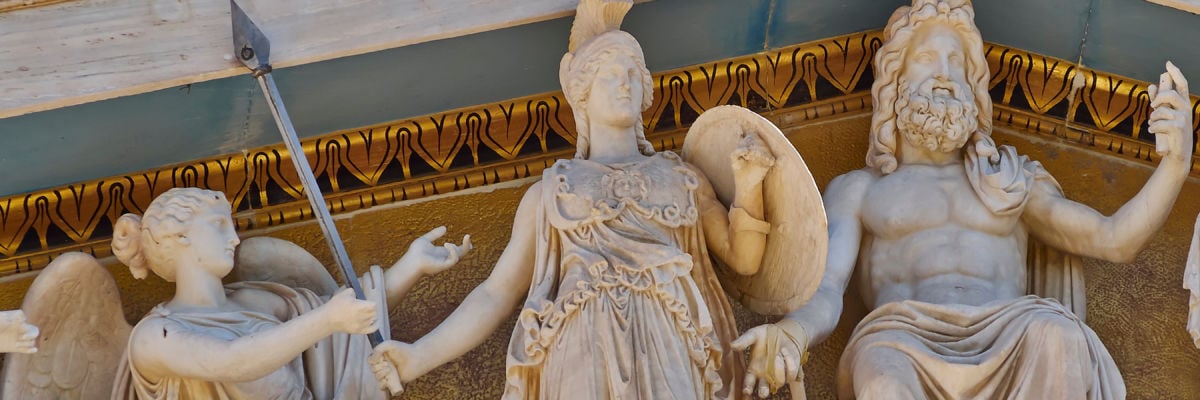
What does the Bible mean when it says, “You are gods” in Psalm 82? In this episode of Catholic Answers Live, Cy Kellett sits down with Jimmy Akin to explore this often misunderstood verse. Does it mean humans become divine? Is it symbolic, literal, or something else entirely? Jimmy offers a faithful Catholic interpretation rooted in Scripture, Church teaching, and the context of Jesus quoting this passage in John 10.
Transcript:
Caller: She quoted these two Bible verses that I hadn’t really heard before as evidence of the Mormon belief in polytheism and that we will become gods after death. The verses are Psalm 82:6, and again, Jesus quotes it in John 10:31-33. Basically, Jesus is talking to some Jews, and they criticize him for saying he’s God. He says, “Is it not written in your law? I have said you are gods.” Sorry, I have toddlers in the background.
Jimmy: That’s good. It’s better to have toddlers in the background than not to have toddlers in the background.
Caller: Yeah, it is.
Jimmy: So the first thing to do, since we’re dealing with an Old Testament text here that’s then used in a New Testament text, which then needs to be related to Christian theology, is to start with the original, figure out what the original text means, then we can look at how it’s used in the New Testament, and then we can figure out how it relates. What we don’t want to do is take a modern theology and read it backwards onto the text. That’s eisegesis rather than exegesis.
So in this case, just starting with Psalm 82, it says, “God presides in the great assembly. He renders judgment among the gods.” Now, what this is referring to is what’s known in scholarly literature as the divine council. One of the things that you find in ancient Near Eastern literature is that the high God was pictured as a king. Kings are surrounded by their councils, you know, who were their officials. It was assumed that, well, okay, our God, you know, Yahweh, he’s a great king, so he’s going to have this divine council around him, and he’s the high God.
So any other heavenly beings up there are subordinate to him. And there’s a question of do you want to call them gods or not at that point? Now, today we tend to use a different word for the subordinate heavenly beings. Today we call them angels, but back then they would call them gods. They recognized there’s a difference of kind between Yahweh, who’s the infinite creator of everything, who’s way above everybody else, and these lesser gods.
They might say, okay, these other nations, you know, like the Moabites and the Egyptians and stuff, like they have their gods, but they’ve got these little bitty gods that are not comparable to the true creator, Yahweh. So the image that Psalm 82 is using here is of Yahweh and his divine council. God is presiding in this council, in this great assembly. It says he renders judgment among the gods.
Then Yahweh says to the members of the divine assembly, “How long will you defend the unjust and show partiality to the wicked?” So he’s charging them with doing bad stuff. He says, “Defend the weak and the fatherless, uphold the cause of the poor and the oppressed, rescue the weak and the needy, deliver them from the hand of the wicked.”
“The gods know nothing, they understand nothing. They walk about in darkness. All the foundations of the earth are shaken.” And Yahweh says, “I said you are gods, you are all sons of the Most High. But you will die like mere mortals, you will fall like every other ruler.”
Then the psalmist says, “Rise up, O God, judge the earth, for all the nations are your inheritance.” This is based on an idea that we find in a number of places in the Old Testament that God has this heavenly council. They’re referred to as the sons of God, even though they’re really created beings. Today we call them angels. He put them in charge of the other nations, but they’ve done bad stuff. Among other things, they’ve encouraged the people subject to them to worship them instead of the Creator.
So here God is denouncing these so-called sons of God that are governing the nations, and he’s going to topple them. The psalmist is encouraging this. It’s like, “Rise up, God, the whole earth is yours. We don’t need these other gods or angels ruling in these other nations. I mean, you take charge, God, you go, God.”
So that’s basically what’s happening in Psalm 82, according to its background with ancient Near Eastern literature. But not everyone agrees with that. There have been attempts to interpret the word “elohim” or gods in this passage in a different sense as referring to judges. The idea here is that God is judging human rulers, like he’s judging human judges and accusing them of misconduct.
But that reading is really strained. It really does look like here we have God, the true God, the ultimate God, berating these other heavenly beings, who in this context are called gods, but we today would call them angels. So I think that’s what this psalm is referring to.
I would agree that this text does envision God as being part of the leader of a heavenly council that includes beings who are at least described as sons of God, even though today, as a Christian, I would classify them as created beings who were also angels.
So that’s what I’d have to say, unless something else occurs to me that’s relevant to this Old Testament text.
Then we move to the New Testament and Jesus’ use of this in the Gospel of John. As you point out, Jesus’ critics have been objecting to him on the grounds that he makes himself equal with God. He then cites Psalm 82, where Yahweh is depicted as saying to the members of the council, “You are gods.”
Jesus says something very interesting. He says, “If therefore, those to whom the word of God came can be called gods, then why are you objecting to me doing that?” Now, it’s interesting. I find that it’s interesting that he uses the phrase “those to whom the word of God came.” That fits with Psalm 82 because Yahweh himself is talking to the members of the divine council when he says, “You’re all gods, you’re all sons of the Most High.”
So he’s talking to them. The word of God came to them. Whatever else is the case about these beings that are being addressed in Psalm 82, they are those to whom the word of God came. God was talking to them.
That sidesteps the issue of are they really gods or are they really angels, or are they really human judges? So Jesus is dodging the question, or at least one construction of this is he’s dodging the question of what’s the exact nature of these beings that are under discussion in Psalm 82. You could support any of those three theories I just mentioned.
Jesus seems to be sidestepping that question and just saying, “Hey, look, the Old Testament calls people besides Yahweh God, so shouldn’t that really happen? You shouldn’t automatically be condemning me for making myself equal to God.”
He’s using this passage as what you might call a squelch to shut up his opponents by giving them a conundrum that they don’t know how to solve because it’s undeniable. The people in this psalm get called gods, and they are those to whom the word of God came.
So I think that’s what Jesus is doing in John’s Gospel with this passage.
Now, how do we relate this to theology, to later theology? Well, Mormons have proposed that humans and God and angels are all the same species and that it’s possible for humans and angels to ultimately become gods of their own planets. But there’s nothing in the text that says that. That is not in Psalm 82. That is not in John’s Gospel. Neither of the passages that we’ve talked about have said humans can progress to become gods of the same type that the Creator is.
So that’s something that they’re reading into the text. They’re not getting it out of the text. On the other hand, Christians, in their use of this text, on the assumption that I think is correct, that these are lesser beings in Psalm 82, are lesser heavenly beings than the Creator who rules them. Today, we’d simply call them angels, and we don’t need to make assumptions about who can become a deity or what’s the exact relationship between angels and humans.
On the Christian understanding, angels and humans are two different species. So humans do not become angels. That is consistent now with both of these texts. It’s not proved by either of these texts, but it is consistent with them.
So what I would say to your friend is that there are things that Christians can acknowledge here, but they are consistent with a Christian understanding of the Divine Trinity, where there are these lesser beings that are sometimes in the Old Testament called gods, and sometimes they’re called sons of God. Today we call them angels.
But on the Christian view, we can’t become them, and we certainly cannot become equal to the Creator. That’s something that is nowhere envisioned in either testament.
So that kind of sketches what I’d have to say to your friend if we were having a discussion of these points.



